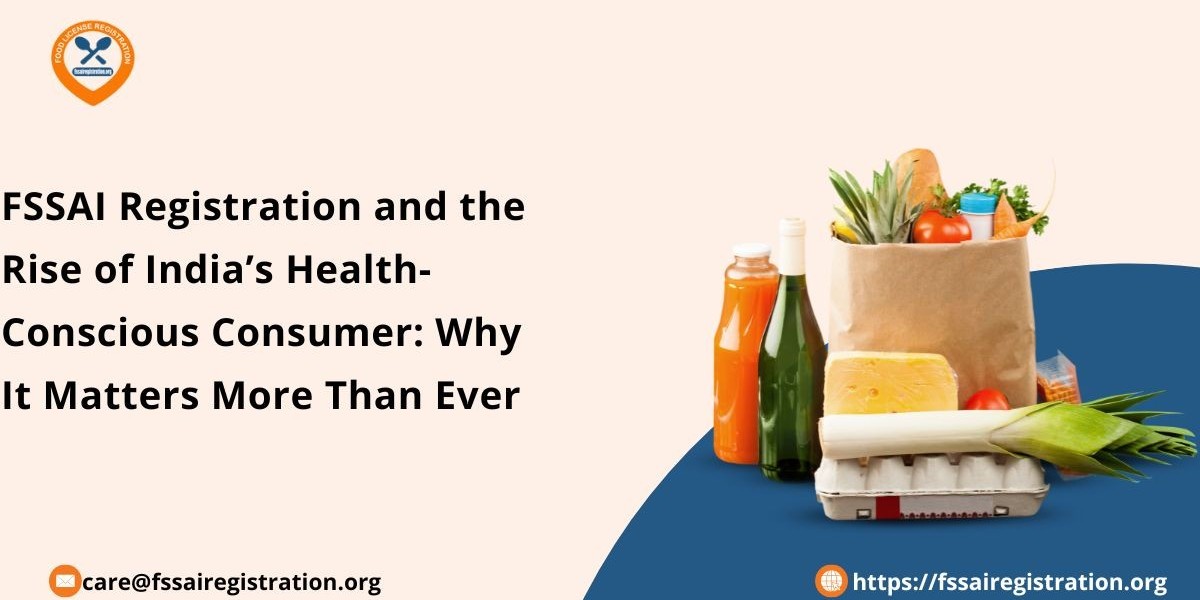Introduction
In the last decade, India has witnessed a sharp shift in how people view food. From simply satisfying hunger, food is now expected to meet higher standards of quality, hygiene, nutrition, and even ethics. Health-conscious consumers are increasing rapidly. As a result, the role of FSSAI registration has evolved beyond being just a legal requirement—it has become a symbol of trust, safety, and brand integrity.
This article explores the importance of FSSAI registration from the lens of India’s growing health-aware consumer base and how food businesses can use this shift as an opportunity for growth.
Understanding FSSAI and Its Core Objective
The Food Safety and Standards Authority of India (FSSAI) is the apex body established under the Food Safety and Standards Act, 2006. Its job is to regulate and monitor food safety practices across India. Every food business operator (FBO)—from a home cook to a multinational brand—must register with or obtain a license from FSSAI, depending on their business size and type.
The primary objective of FSSAI is:
To ensure that food sold in India is safe, wholesome, and hygienic.
To build a transparent regulatory ecosystem for food manufacturers and sellers.
To protect consumers from food adulteration, poor quality, or mislabeling.
Who Are India’s Health-Conscious Consumers?
Today’s consumers are smarter, informed, and cautious. They are:
Reading food labels
Tracking calorie intake
Preferring organic, vegan, or preservative-free products
Following dietary trends like keto, plant-based, or gluten-free
Avoiding products without proper certification
These consumers do not blindly trust a product based on brand name or packaging anymore. They look for certifications like FSSAI to confirm that a product is trustworthy.
Why FSSAI Registration Matters in the Health-Conscious Era
Builds Brand Credibility
Displaying the FSSAI logo and license number on food packages tells customers that:
The food product follows national safety standards
The business is officially registered and accountable
The product has undergone necessary inspections
For health-focused consumers, this level of credibility is often the difference between choosing your product or moving on to the next.
Mandatory for Health Food Startups and D2C Brands
With the rise in direct-to-consumer (D2C) health brands—like millet snacks, organic teas, kombucha, and protein bars—FSSAI registration is not optional.
Online platforms like Amazon, Flipkart, Zomato, and BigBasket require FSSAI license numbers to list food items. Without it, you can’t even begin to sell.
Enables Better Labelling and Nutritional Transparency
Health-conscious buyers demand to know:
What ingredients are in the product
The nutritional value (calories, fats, proteins)
Expiry dates and allergen warnings
FSSAI provides clear guidelines on nutritional labeling, packaging, and ingredient listing, which makes it easier for businesses to build transparent relationships with consumers.
Prevents Legal Trouble and Penalties
Selling food products without an FSSAI license is illegal. Non-compliance can lead to:
Heavy fines up to ₹5 lakhs
Product recalls
Suspension of business operations
Legal action or imprisonment in serious cases
In a health-aware society, even a small lapse in compliance can go viral and destroy your brand’s image.
Offers Eligibility for Government Schemes
FSSAI registration allows small businesses to benefit from:
Startup India schemes
MSME support for packaging and distribution
Export certifications under APEDA, MPEDA
Participation in food expos and fairs
With consumers valuing local, clean, and certified products, FSSAI compliance can open up funding and market expansion opportunities.
Types of FSSAI Registration Based on Business Size
Basic Registration (Form A)
For small food operators with a turnover < ₹12 lakhs/year
Ideal for: Home-based kitchens, hawkers, petty food retailers
State License (Form B)
Turnover between ₹12 lakhs–₹20 crores/year
Ideal for: Medium-sized manufacturers, restaurants, and catering services
Central License
Turnover above ₹20 crores or inter-state operations
Mandatory for import/export businesses
How to Register for FSSAI Online
You can apply via the fssai portal
Visit the FSSAI Website: Start by going to the official FSSAI registration portal online.
Fill in Basic Details: Enter your personal and business details—like your name, phone number, email, business name, type of food you deal with, business type, and full address.
Upload Your PAN Card: Add a scanned copy or photo of your PAN card as part of the application.
Double-Check and Submit: Review all your information to make sure it’s correct, then hit the "Submit" button.
Pay the Registration Fee: Pay the applicable fees online using UPI, debit/credit card, or net banking. The fee depends on your license category.
OTP Verification Call: You’ll receive a call from our team to verify your mobile number or email using a one-time password (OTP).
Inspection (If Needed): In some cases, FSSAI officers may visit your premises for a quick inspection.
Get Your License: Once everything is approved, your FSSAI license will be available for download from the official website.
Documents Required
Passport-sized photograph
PAN Card
Address proof of the business
Aadhar Card
Business registration certificate
Product category list
NOC (if premises are rented)
Food safety management plan (for license holders)
FSSAI and the Organic/Natural Food Trend
Organic and natural food is gaining popularity in India. These foods are expected to:
Be free of harmful chemicals
Follow sustainable farming practices
Have traceable ingredients
FSSAI’s Role During COVID and Post-Pandemic India
During the pandemic, food safety took center stage. Consumers wanted to know:
Is the food safe to consume?
Are hygiene practices being followed?
Is the delivery partner trained in safety protocols?
FSSAI responded with:
Hygiene ratings for restaurants
Training programs like FoSTaC
Guidelines for food delivery safety
Post-COVID, these habits have stayed. So, food businesses must align with FSSAI standards if they want long-term survival.
Suggested read:- FSSAI Food safety license registration for fish exporters in India
Conclusion
In today’s India, FSSAI registration is no longer just about “following the rules.” It’s about:
Winning customer trust
Showing health commitment
Joining the formal economy
Being ready for e-commerce and export
Scaling a sustainable and responsible business
With a rising population of health-conscious consumers, food businesses that ignore safety standards will lose relevance fast. On the other hand, those that embrace FSSAI registration and display their credentials proudly will become the go-to brands of tomorrow.
So, whether you’re a small home-based cook or an ambitious food startup, take that digital step and register your business with FSSAI today.








